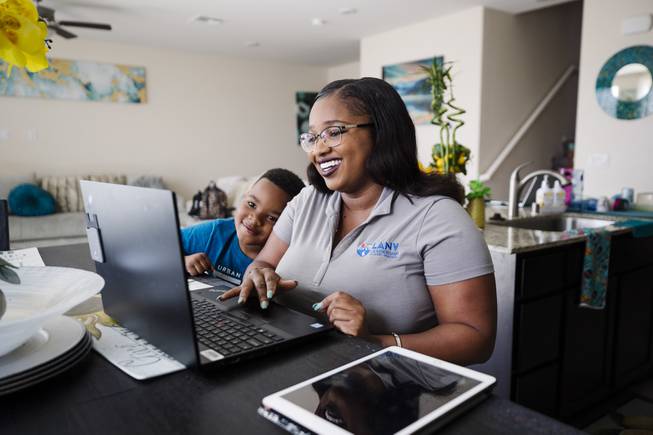
Marrissa Simms, academic coach at Leadership Academy of Nevada, an online school, demonstrates remote learning as her nephew Jourdan Schneider, 5, looks on, Monday, June 29, 2020.
Monday, July 6, 2020 | 2 a.m.
Tom Grover won’t be sending his kids back to school for in-person learning next month. Some families aren’t taking the spread of the coronavirus seriously and it’s not worth the health risk to his family, he said.
“In a class of 18 kids, even if two or three of the parents are anti-maskers or mask deniers, that’s a risk I just don’t want my family to take,” he said.
Schools throughout Clark County finished the past school year exclusively online after pandemic closures in mid-March. It was a lost three months for some because there was no requirement for students to participate as many lacked a computer and reliable internet. But others found remote learning to be freeing and a better option for their family. They’ll continue distance learning moving forward.
A poll by the American Federation for Children, an advocacy organization supporting school choice for low-income families, found 40% of families nationally were likely to home-school their children or have them attend a virtual school following the closures.
The Clark County School District reopening proposal calls for in-person learning two days a week and online learning for three. There is also the option for online-only instruction, which a CCSD survey shows 30% of families would select. School board members will be asked to approve the plan July 9.
Related content
Grover, who has two elementary-school students, is one of those parents. If schools shut down again because of a second wave of coronavirus, Grover said his children won’t have to make yet another adjustment if they’re already engaged in online learning.
“Being online the whole way, I anticipate, might be less disruptive,” he said.
John Anzalone, the principal at Sierra Vista High, estimates about 20% of the school’s 2,600 students will opt for online learning. Anzalone said the school has been preparing its online strategy for a few months, which will make it function more smoothly than last March. Additionally, the district expects to acquire 100,000 Chromebooks for students in need.
“There’s going to be more accountability,” Anzalone said. “The teachers are going to be well versed. We’re going to have onsite experts as well as CCSD experts who are going to help us roll this out.”
Leadership Academy of Nevada — an online public charter school for grades 6-12 — has seen so many families inquire about the school that they have a waiting list to join, said Bryon Richardson, the school’s executive director. The school, which opened in 2014, can accommodate about 50 students per grade.
“We’re quickly filling up. I suspect we’re going to have a waiting list for every grade by the end of July,” he said.
One concern about remote learning is the missed social interaction a student receives from an in-person setting — lunch, assemblies or group projects, for instance. Marrissa Simms, a special-education academic coach at Leadership Academy, said the school has field trips and other on-campus events as part of the curriculum.
“We still build positive relationships with the students and their families,” Simms said.
Richardson said the relationship between students and teachers can sometimes be closer because teachers get to see what a student’s home life is like during the video learning sessions. Students may also feel more comfortable learning in a virtual classroom from home.
Other families are opting for home-schooling, which is independent of schedules and planning provided by the school district and involves less government oversight.
“Home-schooling is when the parent takes full responsibility,” said Elissa Wahl, founder of Nevada Homeschool Network, a watchdog group formed to address state laws that tied home-schoolers to public school standards. She also leads the RISE Resource Center, a Las Vegas nonprofit that educates families on alternative schooling options.
Wahl has never sent her children to public school, saying traditional schools are restrictive. Home-schooling allows students to learn in ways different from sitting at a desk and reading a textbook.
“It wasn’t even about being anti-public school. It was about me being able to better meet my kids’ needs,” Wahl said.
If a parent were to pull their child from CCSD temporarily to home-school them until the pandemic is over, Wahl recommends they use an accredited home-school curriculum. If the student transfers back to public school after a period of home-schooling, their credits won’t transfer unless they’re from an accredited program.
TJ Schmidt, an attorney with the Home School Legal Defense Association, a national nonprofit that advocates for home-schooling families, said the surge in home-schooling amid the pandemic is unprecedented.
Schmidt, who has been at the association for 18 years, said natural disasters or school shootings have caused localized increases in home-schooling, but the pandemic is worldwide, resulting in a much larger rise. Some parents who were already thinking about pulling their kids out of public schools decided to start home-schooling as soon as schools shut down, he said. Roughly 2.3 million students were being home-schooled before the pandemic. That number is expected to increase to 10 million this fall.
“It's a pretty dramatic change,” Schmidt said.
Some states are trying to modify home-schooling requirements to make it easier for parents because of coronavirus, Schmidt said. In some states, families don’t have to report that they home-school their children to the government. Other states require home-school students to have regular assessments and home-school teachers to meet certain qualifications.
In Nevada, parents have to file a notice of intent to home-school with the superintendent of their local school district. Parents must submit an age-appropriate educational plan showing they will teach math, English, science and social studies.
In the past, individuals who were home-schooled had to get a GED or show their SAT scores to be admitted to most colleges or qualify for financial aid. Many universities have since changed admission policies.
The Clark County School Board will meet Thursday to approve the reopening plan for in-person learning. Regardless, some Las Vegans seem to have their minds made up.
Grover said he recognizes the privilege of being a one-income family, noting that many families where both parents work can't stay home with their children.
"The families with two incomes, it’s an impossible position. For us, this is not the same level of imposition. We have the ability to keep our kids home," he said.

